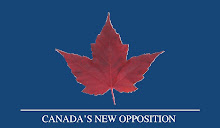I've seen some suggestion that the Governor General should decree a new election rather than hand power to the new coalition. While I don't think this makes any sense (coalitions MUST be formed after the election, when it's clear what combination of parties can achieve the confidence of the house), I think it's useful to point out that if the Liberals and NDP are serious about taking power they have the means to do it.
The first past the post election system is a poor proxy for the people's will at the best of times, and at the worst of times (uh, now) it produces extremely bad results. Roughly two in three Canadians voted Conservative, Conservatives won 46% of the total seats in the house. Roughly two in three Albertans voted "not Conservative", "not Conservatives" make up 4% of the house seats from Alberta.
As much as I'd love to see electoral reform it's not going to happen in time for a Christmas election, so let's see how the Liberals and NDP could try to make parliament more representative of the two thirds of Canadians that voted against the Conservatives.
Start with Saskatchewan, where despite almost half of the population voting "not conservative" the conservatives won 13/14 seats. The Liberals and NDP could make a deal to not run candidates in the following ridings:
Palliser: NDP wins 50.7 to Conservative 44.0
Rosetown-Bigger: NDP wins 48.8 to Conservative 45.4
Desnethe: Liberal wins 48.1 to Conservative 46.7
Assuming that Elizabeth May is up for it she could pull candidates from close races in return for the NDP endorsing her in Central Nova. Then the Greens win 51.8 to 46.6
Elsewhere in NS:
West Nova: Liberal 53 to Conservative 40
South Shore: NDP 57.4 to Conservative 36.1
So our new house so far is:
Cons: 137
Lib: 79
NDP: 40
BQ: 49
Ind: 2
Green: 1
Ok, on to BC:
Vancouver Island North: NDP 49.4 to Conservative 45.8
North Vancouver: Liberal 48.1 to 42.2
Fleetwood: Liberal 49-45
Surry: NDP 51.2-49.4
Saanich-Gulf: Liberal 50-43
Nunavut: Either NDP or Liberal, 57-35
Manitoba:
Winnipeg South: Liberal 46-49
St. Boniface: Liberal 48-46
PEI:
Egmont: Liberal 53-44
Time to update the house count:
Cons: 128
Lib: 85
NDP: 43
BQ: 49
Ind: 2
Green: 1
And we have a tie! Liberals+NDP=Conservative=128. If we throw in Elizabeth May then the Coalition has more seats than the Conservatives without including the Bloc. But we're not done yet because we still haven't come to Ontario!
Kenora: Liberal 55-40
Essex: Liberal 56-40
Huron: Liberal 48-45
Bruce-Grey-Owen: Green 51.1-47.6
Ottawa West: Liberal 47-45
Ottawa-Orleans: Liberal 49-45
Brant: Liberal 50-42
Haldimand Norfold: Liberal 44-41
Mississauga-Erindale: Liberal 51-43
Oak Ridges: Liberal 51-42
Oshawa: NDP 50-41
On to New Brunswick:
Miramichi: Liberal 54-42
Fredericton: Liberal 47-43
And finally Quebec:
Pontiac: Liberal 39 to Conservative 33
Brome-Misisquoi: Liberal 41 to Bloc 35
Alfred-Pellan: Liberal 41 to Bloc 39
Laval: Liberal 40 to Bloc 38
Ahuntsic: Liberal 49 to Bloc 39
Jeanne-Le Ber: Liberal 48 to Bloc 35
Saint-Lambert: Liberal 43 to Bloc 38
Giving us a final seat count of:
Cons: 114
Lib: 103
NDP: 44
BQ: 43
Ind: 2
Green: 2
So the Liberals and NDP now have 147 seats, more than the 143 seats that the Conservatives started out with, and the NDP get to break their old record number of seats. Lets break the seat totals down by fraction of the house and (fraction of votes):
Cons: 37.0% (37.6%)
Lib: 33.4% (26.2%)
NDP: 14.3% (18.2%)
BQ: 14.0% (10.0%)
Green: 0.6% (6.8%)
The Liberals and BQ still out-perform their fraction of the vote due to first past the post, but the Conservative numbers are much more representative of the "will of Canadians" than the 46.4% of the house they currently control.
Now this whole analysis is obviously simplistic, but it serves to show that if the Liberals and NDP are serious about taking power with a coalition government they have a way to co-operate and take a whole lot of seats away from the Conservatives. As I see it the three biggest problems are likely to be:
1) The NDP will (reasonably, in my opinion) want to take a larger share of these seats, but they might have a harder time winning some of these ridings than the liberals.
2) Voters might have trouble plugging their noses even harder than normal to vote for their second choice party.
3) Taking seats away from the Bloc in Quebec will probably make them less likely to support an NDP-Liberal coalition government.
As far as 1+2 go, I get the feeling that the "Anybody but Harper" feeling is so strong right now that for at least this election Liberals, NDPers, and Greens might go along with it. Additionally, in most of the analysis I left out the Green vote, and if the Liberals and NDP are willing to give up three or four more ridings to let the Greens have a good shot they might reap a huge benefit in a lot of other tight races that I didn't include.
I have very little feeling for how the Bloc is likely to react to losing a bunch of seats due to NDP-Liberal co-operation. The Liberals and NDP could decide not to do strategic running in Quebec, I suppose, although I doubt that would play well in Saskatchewan...
My personal hope is that the Governer General gives the coalition a chance to try to govern, but if there is another election I hope that the Liberals and NDP will finally consider removing their guns from each others feet.
